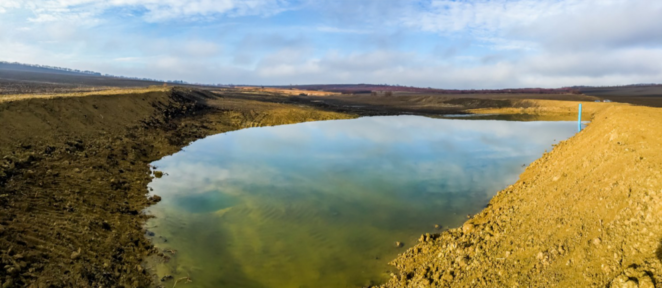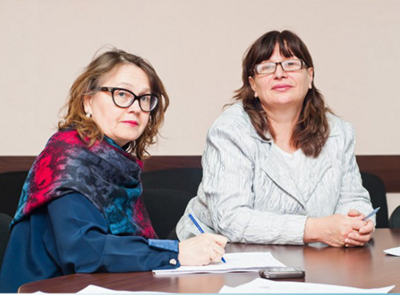Supporting Moldova’s National Climate Change Adaptation Planning Process

Introduction
The project “Supporting Moldova’s National Climate Change Adaptation Planning Process” is funded by the Austrian Development Cooperation Agency (ADA), via the Federal Ministry of Agriculture, Forestry, Environment and Water Management of the Republic of Austria.
Climate variability is already challenging Moldova’s development and future climate change projections show a wide range of impacts across all sectors of the country. The aim of the project is to ensure that Moldova has a system and capacities in place for medium- to long- term adaptation planning and budgeting with the overall aim to reduce vulnerability of the population and key sectors to the impacts of climate change.
The main project objective is to support Moldova to put in place its National Adaptation Planning (NAP) process contributing to and building upon existing development planning strategies and processes and to implement priority adaptation actions. The National Adaptation Plan (NAP) is based on the Climate Change Adaptation Strategy of Moldova (CCASM), approved by the Moldovan government on 08.10.2014, and is developed through a country-driven, gender-sensitive and participatory process. The project also includes a dedicated grant scheme to showcase innovative adaptation measures at the local level (related success stories are provided below).
The project is being implemented by the Ministry of Environment’s Climate Change Office. Working in three key sectors: agriculture, energy, and water resources, pilot projects are being implemented in six districts vulnerable to climate, in order to promote adaptation measures and catalyse their replication in other regions of the country.
Project goals:
- Support Moldova in putting in place its National Adaptation Plan (NAP) process building upon existing development planning strategies and processes and contributing to the implementation of priority adaptation actions;
- Develop the institutional and policy frameworks for medium to long-term gender-sensitive adaptation planning and budgeting;
- Strengthen the institutional and technical capacities for iterative development of comprehensive NAP;
- Demonstrate adaptation interventions in priority sectors to catalyze replication and up-scaling.
Project Activities and Outputs
The planned outputs and supporting activities for the project are outlined below. For a detailed overview of the project, including the motivation behind it and descriptions of each of the activities, please refer to the UNDP project document provided under further resources.
Output 1. Institutional and policy frameworks for medium- to long-term gender-sensitive adaptation planning and budgeting in place
- Activity 1.1: Country-driven, gender-sensitive and participatory National Adaptation Plan developed, taking into consideration vulnerable sectors, groups, communities and ecosystems
- Activity 1.2: Adaptation mainstreamed in priority sectoral development plans
- Activity 1.3: Adaptation Plans for selected sectors developed
- Activity 1.4: Financing Strategy to meet priority national adaptation costs developed
- Activity 1.5: Communication and outreach strategy for support to medium- to long-term adaptation planning developed and implemented
Output 2. Institutional and technical capacities for iterative development of comprehensive NAP strengthened
- Activity 2.1: Sectoral planners are trained in the use of the tools and approaches to advance medium- to long-term adaptation planning and budgeting and implementation
- Activity 2.2: Data availability, management, dissemination and capacity to support adapttaon planning improved
- Activity 2.3: Partnerships to support adapttaion planning and advance adaptation action in Moldova established
Output 3. Adaptation interventions in priority sectors implemented including demonstration projects at a local level to catalyse replication and upscaling
- Activity 3.1: Priority and innovative on-the-ground adaptation measures implemented in the most vulnerable areas/sectors in each of the three Development Regions
- Activity 3.2: A pipeline of strategic adaptation interventions for medium- to long-term implementation developed
- Activity 3.3: Replication and upscaling of adaptation interventions supported
Success Stories
Agriculture – developing climate resilient practices

Moldova is a landlocked country in Eastern Europe. Cereals, as well as fruits and vegetables – especially apples – are also among the top five of Moldovan agriculture exports. The agriculture and food processing sector together make up about 40 percent of the country’s gross domestic product.
In Moldova, households reliant on farming have been the first to feel the impacts of climate change. With three-fourths of Moldova’s land used for food production, Moldova’s economy relies heavily on agriculture, which is being jeopardised by extended droughts and desertification processes, temperature increases, decreased water reserves, and soil erosion, all of which conspire to decrease food security and household income.
Through the project’s dedicated grant scheme to showcase innovative adaptation measures at local level, 3 grants have been given related to agriculture. The beneficiaries of these grants have been working to improve agricultural conservation practices, while helping to restore soil fertility.
Read more here: Cultivating climate resilience in Moldova
Water Resources – restoring reservoirs

Moldova is one of the most agriculture-dependent countries in Europe, yet current water reserves are already classified as “insufficient”. Climate change forecasting predicts that available surface water will decrease by up to 20% by 2020, further endangering human health, the ecosystem and the economy.
As part of the work under the small grant programme, two pilot reservoir projects are under way. In the Sîngerei district in the north, a reconstructed reservoir uses snowmelt and rainfall to bolster groundwater storage ponds, ensuring that crops can continue to be irrigated during heat waves and droughts. This secure water source benefits 3,500 residents in Tiplesti village and residents of neighbouring settlements.
With the restored reservoir, irrigation is now viable, soil erosion is reduced, and productivity is increasing. As the spring and summer of 2016 approaches, the farmers of the Sîngerei district can already see results, with a combination of snowmelt and spring water beginning to fill the reconstructed reservoir and serving as a springboard for the new season’s planting.
Read more here: Restored reservoirs allow business to bloom in rural Moldova
Energy – supporting energy independence

In Moldova, climate change represents a serious threat to the energy sector. With higher temperatures, fluctuating rainfall, and an increasing number and severity of extreme weather events, climate impacts are decreasing the efficiency of power stations and pipelines, and compromising energy production and delivery. For a country with high dependence on imported energy, Moldova has experienced significant increases in the prices for natural gas and electricity over the past few years. Coupled with currency volatility, consumers throughout Moldova are struggling to pay their energy bills.
Energy shortages, and resulting high costs impinge on human development. From this perspective, the implementation of adaptation measures is not an optional enterprise, but a critical necessity.
The project’s dedicated grant scheme has supported the installation of two large photovoltaic systems: a 13 kW system to support 17 businesses within the Sîngerei Business Incubator, and a 10.5 kW system at Peasant Farm, which will be used for refridgeration and for pumping water around the site.
The recipients of these grants have increased their energy independence, and reduced their annual electricity consumption by 35-40%.
Read more here: Lighting the way for climate-resilient energy in Moldova
Gender – empowering women

People, especially women, come with experience from home, but need help to upskill in order to climate-proof their businesses. This has taken the form of mini grants for training on effective adaptation interventions and improving climate-resilient farming practices.
As part of these efforts, Ms. Brasovschi implemented the pilot project “Green energy for entrepreneurship activities” and offered consulting and support to individuals on how to manage resources, fundraise, etc. The grant has offered consulting to 17 entrepreneurs, including 12 women and 5 men. 80% of these women are from vulnerable families who needed strong support – financial, social, and managerial.
Read more here: Women leading the way to climate-resilience in Moldova

Related resources
- Read the UNDP project summary [download UNDP project summary document]
- Go to the project website [available in Romanian and English]
- Read supporting literature [Romanian]
- Read the report "Mainstreaming Climate Change Adaptation into Moldova's Policy and Planning" [Romanian and English]
- 2016 ADA/UNDP Project Photobook
(0) Comments
There is no content